PROGRESS 2050: Toward a prosperous future for all Australians
31/05/2012
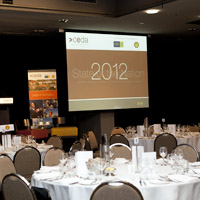 |
|
Key speakers included Treasury Secretary Dr Martin Parkinson, Federal Opposition Leader Tony Abbott, Ministers Martin Ferguson, Penny Wong, Chris Evans and Bill Shorten and Productivity Commission Chairman, Gary Banks.
Speeches and discussions from this year's State of the Nation received widespread media attention highlighting the relevance and timeliness of the discussions on these key topics. Below is a synopsis of key sessions and speakers. Audios and full speeches are included where available.
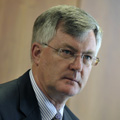 |
|
Department of the Treasury, Secretary, Dr Martin Parkinson
Australia is well placed to deal with further economic turmoil, was a key message from Department of Treasury Secretary, Dr Martin Parkinson, in his keynote address on day one of CEDA's State of the Nation in Canberra.
He said the recent Greek election did not eliminate risk, and the absence of political will in Europe to implement policies better suited to the circumstances confronting the Eurozone member countries, remained a key issue.
However, he said Australia had capacity to respond to any new crisis and maintain its relatively strong economic position.
Dr Parkinson said it was no accident Australia was in such a strong position and the current economic framework had served us well, but we need to continue to foster and build on that framework for coming generations.
He said the three pillars of our macroeconomic framework were a floating exchange rate, independent monetary policy and fiscal policy, underpinned by structural policies that have fostered flexibility and growth.
"It is our frameworks that have stood us in good stead through the global financial crisis and recent period of structural change, and they will continue to do so," he said.
"And if you don't believe this, ask yourself the following questions: What would Australia look like today had any one of those policy pillars been missing in recent years?"
Dr Parkinson said the current economic climate had resulted in suggestions by some to dismantle or undermine this framework but "it is important that we maintain and build on these assets".
He said the four big drivers of economic change for Australia were the growth of the middle class in China and India, our ageing population, environmental sustainability and emerging technology.
"If we can respond to these challenges the next two decades will be as prosperous, if not more so, than the past two decades," he said.
Commenting on the role and current contribution of business in future reforms, Dr Parkinson said business has to be a central player in policy development and Australia has "done the best when we've had robust and respectful discussions".
"There is a degree of disgruntlement in the business community that is making it hard for them to participate in those debates in a way that they should at the moment," he said.
"I don't mean that people aren't willing to talk, but it seems there can't be discourse without criticism.
"We need to take the heat out of the debate and get back to doing what we've done well as a society which is to talk thoughtfully, carefully and respectfully, based on data, about the choices available to us and how we might get there.
"We can only deliver big reforms if government has the political capital to expend and we can only have governments with political capital to expend, and this applies to State and Federal Governments and to whoever is in power, if there is agreement about the general direction."
On questioning about why Australia had done so much better than New Zealand, despite having similar economic frameworks, Dr Parkinson said it was a combination of more investment in skills and education, being more open to trade, diverse migration and our resource endowment.
Full speech
Event audio (member login required)
Political round-up
Opposition Leader sets our priorities
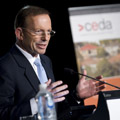 |
|
The issues on Federal Opposition Leader, Tony Abbott's, agenda when he addressed CEDA's State of the Nation attendees included removing the carbon tax, recent attacks on business leaders and spending cuts.
On the Budget, Mr Abbott said a surplus was achieved by "cooking the books" and would only be achieved if everything goes right for the Gillard Government, "and as we know from this Government, which has the Midas touch in reverse, most things don't go right for this Government".
He said the Opposition was currently going through the Budget to look at programs that could be cut and a priority if elected would be to get spending down.
Mr Abbott said examples of possible cuts included $300 million spent by the Commonwealth with the states to improve literacy and numeracy rates without "making any appreciable difference" and $600 million spent by the Commonwealth with the states to reduce hospital elective surgery waiting times when they have "actually got longer not shorter".
"We are going through the budget line by line, program by program, to identify aspects of Commonwealth spending which we not believe are making an appreciable difference to the lives of the Australian people because economies can and must be made," he said.
On the carbon tax, Mr Abbott said the first order of business if elected would be to remove it and it can be done.
"There is a simple constitutional principle that no Parliament can bind its successor. What has been done by legislation can and will be undone by legislation," he said.
In conclusion he said that a Coalition Government would never make the sort of attacks on leading business figures seen in recent months or attempt to create a "phoney class war".
"Governments can hinder wealth creation, they can't create it themselves. Only profitable private business in the long run can create the wealth that is needed to sustain a cohesive and strong society such as ours," he said.
Full speech
Event audio (member login required)
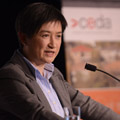 |
|
Minister for Finance and Deregulation, Penny Wong
Increasing productivity is key to managing our changing demography, Minister for Finance and Deregulation, Penny Wong, has told CEDA's State of the Nation attendees.
"As the number of workers relative to those out of work declines, the productivity of our economy needs to increase," she said.
She said the three areas for reform that the government sees as crucial to our future productivity and economic growth were skills and participation, investment in physical capital and regulatory improvements.
She said while investments in physical infrastructure would improve productivity, it was the government's investment in the National Broadband Network that was likely to unleash the greatest gains.
"Importantly the NBN is an open access network that provides the perfect platform for innovation and entrepreneurship," she said.
On regulation, Ms Wong said regulation that was not fit for purpose or as efficient as possible should be reformed or removed.
Some of the most beneficial reforms that could be delivered would require collaboration across Federal and State Governments, the business sector and unions, she said.
Full speech
Event audio (member login required)
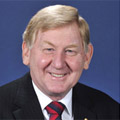 |
|
Minister for Resources and Energy, The Hon Martin Ferguson AM MP
Price restrictions for gas sends the wrong message to investors, Minister for Resources and Energy, Martin Ferguson, has told CEDA's State of the Nation attendees.
"Access to lucrative export markets is what underpins investment, accordingly Australia's free market policy has allowed for major investments," he said.
"It is my view that restricting energy exports in a bid to suppress energy prices would provide the wrong signals to potential investors in Australia."
He said price restrictions only led to the inefficient allocation of resources, and could ultimately lead to supply and reliability issues.
Mr Ferguson said priorities for the government were its skills strategy, to assist in getting workers to the right locations for resources projects, and also reducing regulatory burden and double handling.
There are currently 98 resource projects at an advanced stage of development, he said and the Government's focus on skills would be vital in helping ensure that these projects get off the ground while commodity prices are high, because the earlier the projects are established the greater the benefits.
On calls to increase domestic gas supply, he said "calls for intervention in the market would only serve to dampen any appetite for the very investment needed to bring on new gas supplies in Australia".
"Artificially holding down gas prices, as a reservation policy will do, only acts as a disincentive for gas extraction activity and may risk gas shortages in the longer term," he said.
With regard to the role of gas domestically, he said: "Gas is seen by many as a bridge to the future energy market creating lower carbon emissions while the price of renewable energy becomes more competitive," he said.
However, he said the role of gas may take longer to materialise than previously expected, due to greater uptake of rooftop solar, lower demand than expected from industry, milder weather patterns, and greater response by customers to higher prices, who have reduced usage.
Mr Ferguson said LNG had been the "star performer in energy sector" but coal-seam gas would become increasingly important.
"Foreign investment I would put to you, has been vital to the ongoing development of our unconventional gas resources for domestic and international customers," he said.
However, he said an important step for the continued development of unconventional energy would be getting "our social licence to operate" back and government was working hard to ensure the right regulatory processes were in place, with a uniform national approach to assist industry and address debate around fracking and water issues.
However, in addition he said the petroleum industry also needed to improve community consultation.
"Some companies need to get better at how they engage with local rural communities. The mining companies I think have historically been better at that because it's been their bread and butter, but the petroleum industry, to a large extent... this is new to them," he said.
Full speech
Event audio (member login required)
 |
|
Australian Catholic University, Adjunct Professor, Greg Smith
Tax cuts between 2005 and 2008 were never affordable and the current government had made the right decision not to cut the company tax rate now, Australian Catholic University, Adjunct Professor Greg Smith, told attendees at CEDA's State of the Nation.
Speaking on Productivity, Welfare and Work: Rethinking our tax structure, Mr Smith said tax collection in the last four years had not reached the average of the previous eight years, and was not going to get back to those levels until the second half of this decade.
He said the tax cuts of the last three years of the Howard Government and the first year of the Rudd Government were never affordable and along with the GFC, which hit asset values and to a lesser extent income flow, had reduced tax collection.
Tax collection rates would not return to the higher levels without significant recovery in the economy and fiscal drag, with a return through inflation of the tax burden on individuals, he said.
On calls to improve investment in Australia, Mr Smith said we already have the world's highest investment rate and "the idea that we can increase the investment rate in Australia in the next five years is ridiculous, it is completely absurd".
"We can try to restructure it and we should, we should try to make it more efficient... but we are not going to improve without an enormous amount of stress and trouble," he said.
"We can improve our productivity significantly by improving the allocation of investment and that should be the focus of tax policy concern."
Mr Smith also discussed the impact of our changing demography and the need for increased mature age participation in the workforce and changes to the structure of superannuation.
"I've been personally associated with creating the superannuation industry in this country," he said.
"I don't feel very proud about that, I think it's an achievement, yes, but it's not the answer."
Mr Smith said life expectancy had significantly increased with the average number of years of retirement going from 12 to more than 20 and "we cannot have retirement going for 25, 30 years".
"Super is basically an early retirement system. It is not really dealing with the very high cost of aged care and health in late retirement," he said.
"I'm not against superannuation but it is not fit for purpose at the moment."
Event audio (member login required)
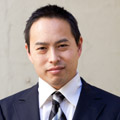 |
|
Centre for International Security Studies, Adjunct Associate Professor, John Lee
Better access for foreign firms in South East Asian countries is likely in the future, Centre for International Security Studies, Adjunct Associate Professor, John Lee, has told CEDA State of the Nation attendees.
Speaking on the opportunities of the Asian Century, Mr Lee said we have to be careful not to focus too much on China.
"Opportunities is one thing, getting access to opportunities is another...and this is where sovereign risk comes in," he said.
He said China gave unusual advantages to state owned enterprises even to the disadvantage to private Chinese companies.
"China allows only a very few joint ventures into the country and this is designed to largely hasten technology and know-how transfer, but the relative closed nature of the Chinese domestic consumption market is also intrinsically tied to the Chinese Communist Party's political and regime objectives and this is unlikely to change in the future," he said.
"In contrast, most South East Asian countries, they may be closed in some respects now, but my bet is they will offer much better access to foreign firms (in the future)."
In addition he said: "India as we all know is a difficult place to do business but the long term political trend is to be open to doing business with foreign firms, unlike China."
"When it comes to opportunities I'd give two pieces of general advice, first it is an Asian Pacific Century, an important distinction," he said.
"Second, separate reality from the hype, avoid over reliance on long-term linear extrapolations because they are almost always wrong, don't rush to pick winners in a region ahead of time and seek real rather than imaged opportunities as the evidence comes to light."
Mr Lee also warned that we may see more nuclear armed Asian countries in the future.
"Asia is rising on the back of six decades of relative peace and stability underwritten by American power," he said.
"Substantially remove America from equation and we could see, perhaps you'll likely see a nuclear armed Japan, a nuclear armed South Korea, and possibly a nuclear armed Vietnam and a nuclear armed Indonesia in the future."
Event audio (member login required)
